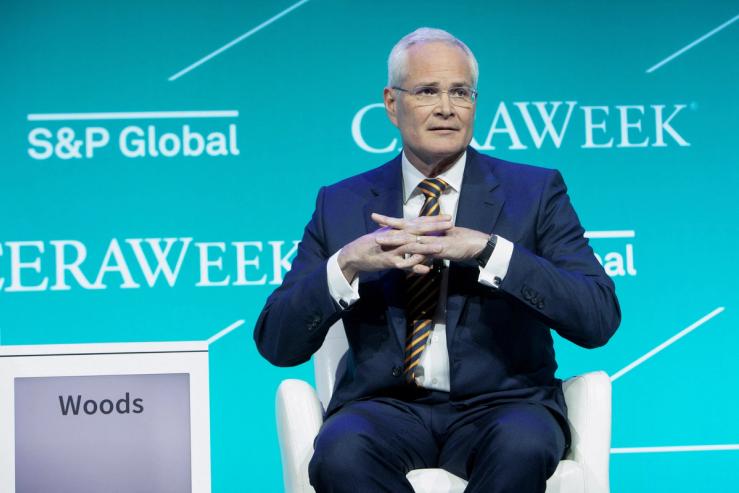The News
The US-European Union trade deal unveiled last week is a quiet victory for US fossil fuel companies, and could hollow out the foundations of Europe’s climate and energy transition strategies.
Details of the deal published on Thursday take aim at several EU climate policies, including new rules for how companies operating in Europe must establish and report progress on plans to reduce greenhouse gas emissions in their own operations and across their supply chains. In the deal, EU leaders committed to ensure these rules “do not pose undue restrictions on transatlantic trade,” which suggests they may be watered down. US industry groups including the American Petroleum Institute and the US Chamber of Commerce had lobbied the White House to push back on these rules during trade negotiations: Earlier this month, ExxonMobil CEO Darren Woods said their impact on his business would be “bone-crushing,” while Dustin Meyer, API’s senior vice president of policy, economics, and regulatory affairs, told Semafor that his organization had “been working hard to explain to the [Trump] administration just how unprecedented and misguided this policy is.”
Even though it’s not clear what exact changes to the policies will be forthcoming, the deal represents a major concession from the EU that shows its commitment to the role of global climate champion could become an early casualty of US President Donald Trump’s trade wars.
In this article:
Tim’s view
When the US-EU trade deal was first announced in broad terms last month, its energy components seemed far-fetched: A European commitment to buy $750 billion in US energy products in the next three years will almost certainly be impossible to fulfill. The ESG policy concessions could prove to be much more meaningful, and they set a precedent for the Trump administration to use trade negotiations as a forum for undermining other countries’ climate policies when fossil fuel groups find them problematic.
The EU’s Corporate Sustainability Due Diligence Directive, which is due to take effect in 2027, requires companies that are either based in or do significant business in Europe to identify human rights and environmental risks in their operations and take steps to mitigate them. For large companies, that includes having a net-zero plan in line with the Paris Agreement goal of limiting global warming to 1.5°C. And it extends to a company’s upstream suppliers even if those suppliers don’t do business directly in the EU. Companies that don’t comply could face penalties of up to 5% of global revenue, which for a company like Exxon could amount to tens of billions of dollars.
The policy is fundamental to the EU’s climate plan; the bloc can’t promise to decarbonize by 2050 unless it has a way of requiring its businesses to do the same. But from the point of view of US industry groups, the CSDDD reaches much too far beyond Europe’s borders. The policy’s “extraterritorial reach and imposition of civil liability risks on American businesses operating in nearly every economic sector are especially harmful and must be addressed as part of any successful long-term framework enhancing bilateral trade between the US and EU,” said Marjorie Chorlins, senior vice president for European affairs at the Chamber of Commerce.
The rules are already enshrined in European law. But even before Trump took office, there was an effort by some European lawmakers, frustrated by the complexity and cost of the EU’s climate plans, to revisit them. Negotiations on amendments to the policy are underway, and will likely conclude early next year, said Tsvetelina Kuzmanova, EU sustainable finance lead at Cambridge University’s Institute for Sustainability Leadership. As a result of pressure from the Trump administration, she said, changes could include allowing companies to set weaker net zero plans, curtailing the scope of supply chain requirements, or allowing companies more time for compliance, among other steps.
The trade deal also commits to weakening the EU’s deforestation regulations and its Corporate Sustainability Reporting Directive, which dictates ESG information companies must make public. It calls for “additional flexibilities” in the EU’s tariffs on carbon-intensive imports. Taken together, Kuzmanova said, the concessions put the whole thrust of the EU’s climate plan — regulations and laws collectively referred to as its Green Deal — at risk. And in a more immediate, tangible sense for European companies, they indicate that investments made in preparation for compliance with these rules could be wasted.
“It sends an extremely problematic signal that if we get pressure from outside, all of this is up for negotiation,” she said.
Room for Disagreement
The European Commission may have been willing to negotiate with Trump, but it made clear on Tuesday there are limits to the compromises it’s willing to make. “It is the sovereign right of the EU and its member states to regulate economic activities on our territory,” a spokesperson said, after Trump threatened additional tariffs on countries with tech policies he disagrees with.
As for ESG policy, the full repeal of CSDDD that groups like API had sought still looks unlikely, and the trade deal doesn’t touch on European rules for methane emissions that are poised to become a problem for US LNG exporters. As is often the case with Trump’s trade negotiations, the vital details were left for another day. That means oil lobbyists aren’t prepared to let Trump off the hook just yet. “Just tweaking around the edges really isn’t enough,” the API’s Meyer said. “In our mind, this needs to be completely rethought, or at the very least, have US companies fully exempted from this. We really need to hear a lot more details and firmer commitments as to what those changes are going to be.”
Notable
- Europe’s energy transition is also increasingly under threat because of its overwhelming reliance on critical minerals from China. “Our dependence on Russia for energy is very mild compared to our dependence on China for critical minerals,” one European politician told the Financial Times.


